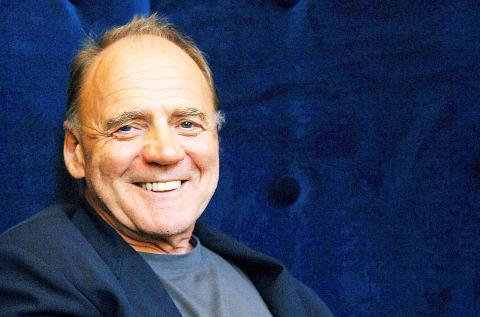Bruno Ganz, the Swiss actor who portrayed Adolf Hitler in Oscar-nominated film Downfall, died of cancer at his home in Zurich, Switzerland, on Saturday aged 77, his agent said.
He is survived by his son, Daniel.
Ganz had been active in German-language theater, film and television for more than 50 years and was the holder of the Iffland-Ring.

Photo: EPA-EFE
It is passed from actor to actor to mark the recipient as the “most significant and worthy” German-speaking actor of their era.
It is not known to whom Ganz had chosen to pass the heirloom at the time of his death.
The actor became internationally renowned for his 2004 portrayal of the dictator of Germany in the final days inside his Berlin bunker.
His lengthy rants in the film became a recurrent meme with subtitles laid over the footage to create parodies of everything from sporting events to current affairs.
Speaking to the Guardian in 2005, Ganz said that during the months of painstaking research, that involved looking at historical records, including a secretly recorded tape of Hitler, before taking on the role he became convinced that Hitler was suffering from Parkinson’s disease toward the end of his life.
“There is newsreel of him presenting medals to the Hitler Youth a few days before his death, and you can see his hand shaking, so I visited a hospital and observed Parkinson’s sufferers,” he said.
The actor said he was “fascinated” that Hitler “was not just supported by the German people; he was loved.”
“The relationship between him and them was almost religious. There was also that Wagnerian undercurrent — the hero dressed in white, standing against a corrupt world... It is like a cult. So it helped me that I am Swiss, not German,” he said.
However, Ganz added that he had not gained real insight into Hitler’s motivation, saying: “I cannot claim to understand Hitler. Even the witnesses who had been in the bunker with him were not really able to describe the essence of the man.”
On the actor’s 75th birthday the German news outlet Deutsche Welle reported that Ganz’s decision to quit school and pursue his dream of acting baffled his parents.
In the early days of his career he worked as a bookseller and a paramedic before he broke into film with roles in The Marquise of O, which won a special prize at Cannes in 1976, and Peter Stein’s drama Sommergaste (“Summer Guests”).
He also played a vampire in Werner Herzog’s Nosferatu the Vampyre (1979) and an angel in Wim Wenders’ Wings of Desire (1987) and its sequel, Faraway, So Close! (1993).
In 2008 Ganz appeared in The Baader Meinhof Complex and last year he was in Lars von Trier’s The House That Jack Built.
He played Heidi’s grandfather in a 2015 Swiss film about the national heroine, seeing it as a kind of patriotic duty.
“One of the most important actors of our time goes, his brilliant work remains. We mourn with the family and friends of Bruno Ganz,” German Minister of Foreign Affairs Heiko Maas said in a tweet.
He was remembered on Saturday evening at the closing gala of the Berlin Film Festival, where much of the film world was gathered to hear which film would win this year’s coveted Golden Bear award.
“We remember someone who can’t be here this evening: Bruno Ganz, in the sky over Berlin,” host Anke Engelke said.

Nauru has started selling passports to fund climate action, but is so far struggling to attract new citizens to the low-lying, largely barren island in the Pacific Ocean. Nauru, one of the world’s smallest nations, has a novel plan to fund its fight against climate change by selling so-called “Golden Passports.” Selling for US$105,000 each, Nauru plans to drum up more than US$5 million in the first year of the “climate resilience citizenship” program. Almost six months after the scheme opened in February, Nauru has so far approved just six applications — covering two families and four individuals. Despite the slow start —

North Korean troops have started removing propaganda loudspeakers used to blare unsettling noises along the border, South Korea’s military said on Saturday, days after Seoul’s new administration dismantled ones on its side of the frontier. The two countries had already halted propaganda broadcasts along the demilitarized zone, Seoul’s military said in June after the election of South Korean President Lee Jae-myung, who is seeking to ease tensions with Pyongyang. The South Korean Ministry of National Defense on Monday last week said it had begun removing loudspeakers from its side of the border as “a practical measure aimed at helping ease

DEADLY TASTE TEST: Erin Patterson tried to kill her estranged husband three times, police said in one of the major claims not heard during her initial trial Australia’s recently convicted mushroom murderer also tried to poison her husband with bolognese pasta and chicken korma curry, according to testimony aired yesterday after a suppression order lapsed. Home cook Erin Patterson was found guilty last month of murdering her husband’s parents and elderly aunt in 2023, lacing their beef Wellington lunch with lethal death cap mushrooms. A series of potentially damning allegations about Patterson’s behavior in the lead-up to the meal were withheld from the jury to give the mother-of-two a fair trial. Supreme Court Justice Christopher Beale yesterday rejected an application to keep these allegations secret. Patterson tried to kill her

CORRUPTION PROBE: ‘I apologize for causing concern to the people, even though I am someone insignificant,’ Kim Keon-hee said ahead of questioning by prosecutors The wife of South Korea’s ousted former president Yoon Suk-yeol yesterday was questioned by a special prosecutor as investigators expanded a probe into suspicions of stock manipulation, bribery and interference in political party nominations. The investigation into Kim Keon-hee is one of three separate special prosecutor probes launched by the government targeting the presidency of Yoon, who was removed from office in April and rearrested last month over his brief imposition of martial law on Dec. 3 last year. The incident came during a seemingly routine standoff with the opposition, who he described as “anti-state” forces abusing their legislative majority to obstruct